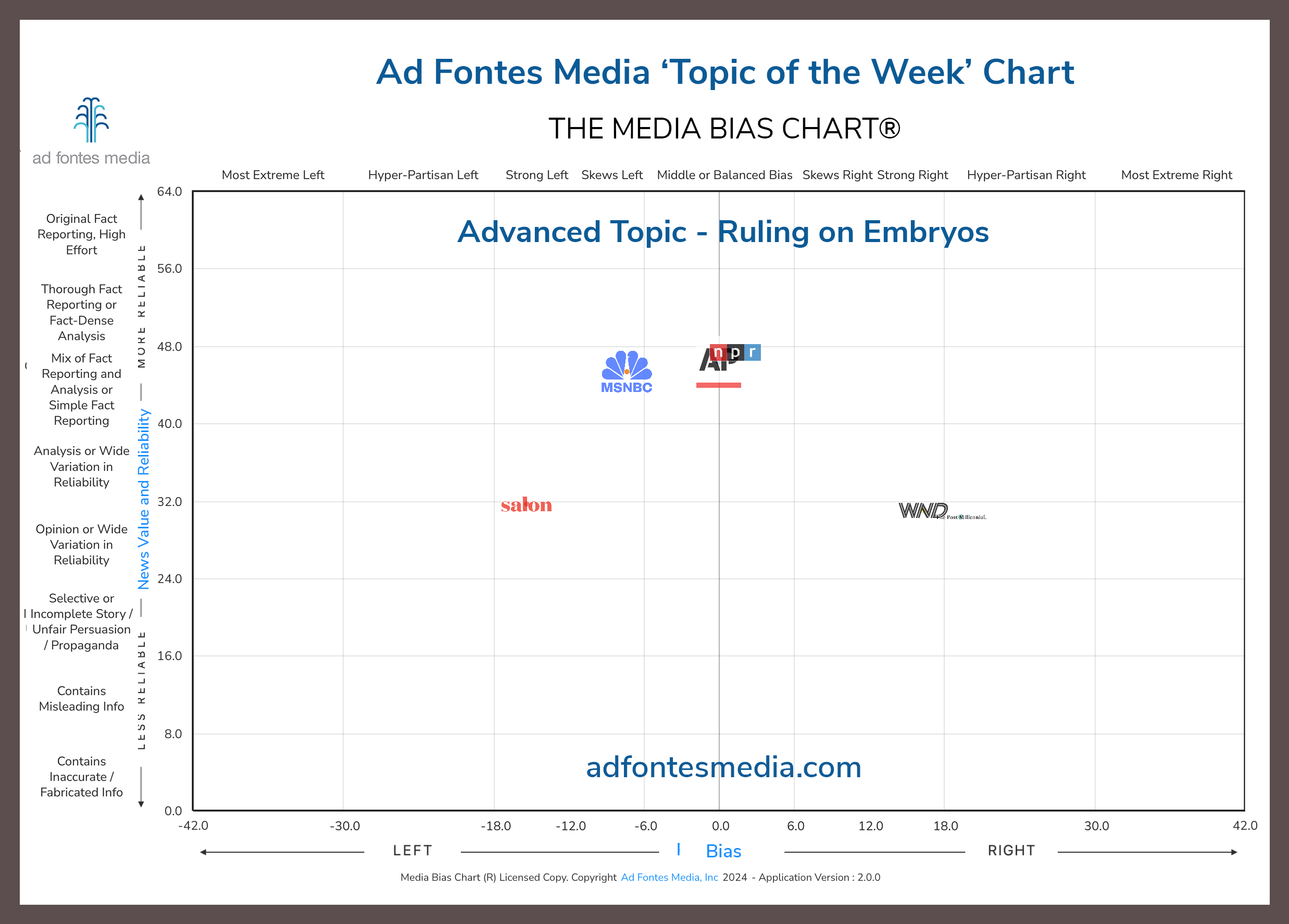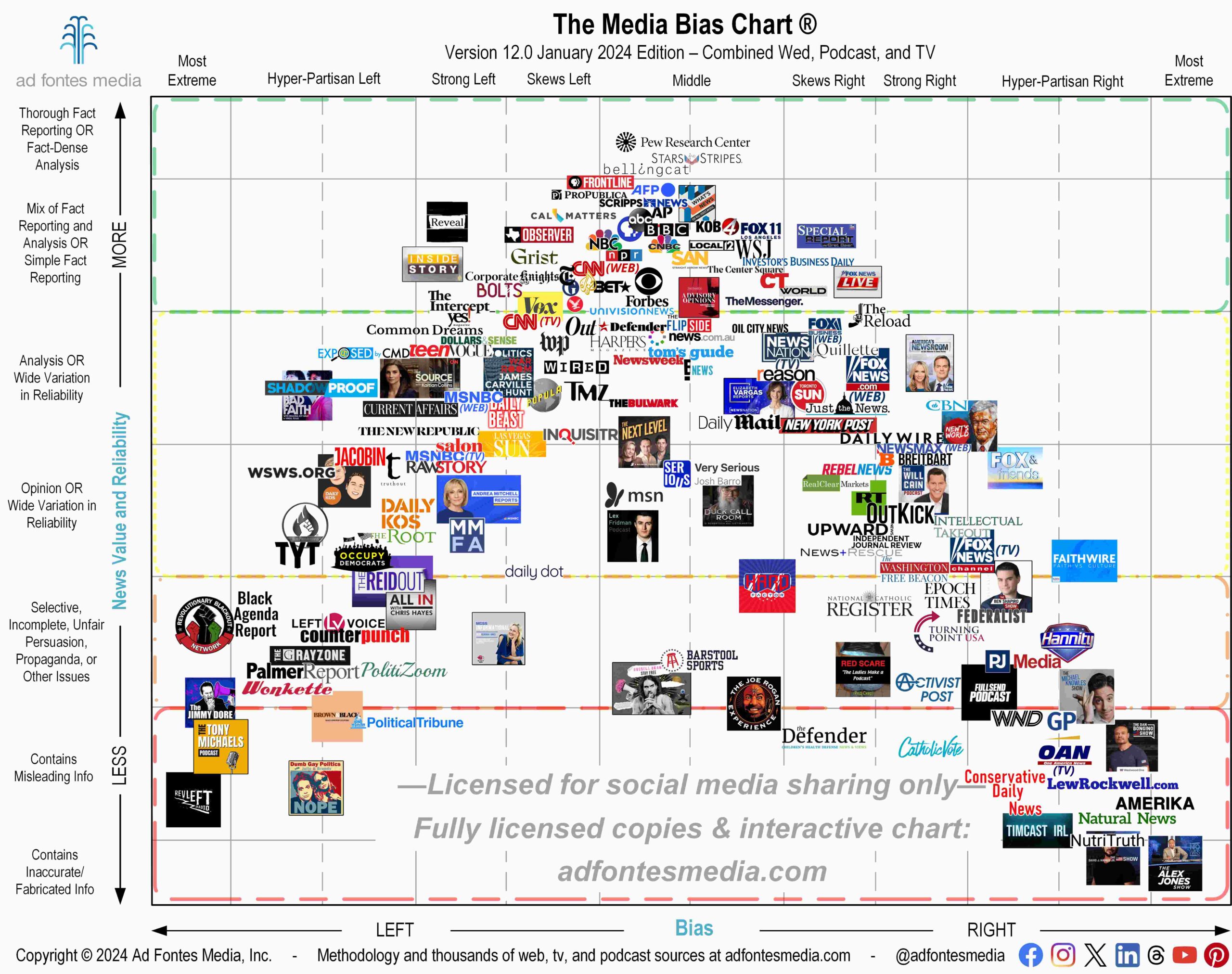Menu

The Alabama Supreme Court Ruled That Frozen IVF Embryos are Children, Opening Health Care Providers to a Possible Array of Legal Issues
The Media Bias Chart takes a look at articles that argue both sides of the debate
Author:
Sara Webb
Date:
03/01/2024
On Feb. 21, the all-Republican Alabama Supreme Court ruled that frozen embryos created through IVF are considered children under state law, potentially exposing families and clinics to criminal charges or punitive damages. In response, the state’s largest hospital and at least two other providers paused IVF treatments as they scrambled to assess the ruling’s impact. Our analysts examined coverage of this decision in our Topic of the Week.
Each week, Ad Fontes Media chooses a widely covered trending news topic to share insight into how our analysts rank news coverage for the Media Bias Chart®. To do this, we select six articles reporting on the same story from different outlets to show how each treated the subject.
Once we choose a set of articles, a pod of analysts with diverse political perspectives (one right leaning, one center, and one left leaning) read each article and use Ad Fontes Media’s content analysis methodology to determine its bias and reliability. These ratings inform the articles’ placement on that week’s special Media Bias Chart.
Our analyst team read and examined several articles from various media outlets on this topic: “Alabama Gov. Kay Ivey says she wants to protect IVF treatment after court ruling” from NPR, “State Supreme Court rules embryos ARE children!” from WND, “Some Republicans are voicing doubt over Alabama IVF ruling. Democrats see an opportunity” from the Associated Press (AP), “The massive legal fallout from Alabama’s IVF ruling is just the beginning” from the MSNBC website, ““Next it’ll be birth control”: Hillary Clinton warns of what Alabama’s IVF ruling could impact” from Salon, and “Alabama Supreme Court rules that frozen embryos are protected in sanctity of life case” from The Post Millennial. The bias and reliability scores for each of these articles can be found on our Topic of the Week page. This week, we will look at the coverage from those last two sources.
Salon is a news and opinion website created in 1995, and was one of the first all-digital media outlets. Our analysts have rated the source overall at 31.84 for reliability (opinion or wide variation in reliability) and -14.63 for bias (strong left). Our analysts rated this article in those same categories, 31.67 for reliability and -15.33 for bias.
Across its front page, Salon spotlights Hillary Clinton declaring that the same conservatives who ruled that frozen embryos were children could turn their sights to birth control, an already contentious issue, next. Clinton wrote on X (formerly Twitter), “They came for abortion first. Now it’s IVF and next it’ll be birth control. The extreme right won’t stop trying to exert government control over our most sacred personal decisions until we codify reproductive freedom as a human right.”
Salon also quotes Health and Human Services Secretary Xavier Becerra, “I’ve long made clear that overturning Roe was just the beginning of the attacks on women’s health, privacy, & autonomy — and that’s exactly what we continue to see.” This is a popular and growing sentiment on the left to fear that a small number of far-right lawmakers will make women’s bodily autonomy a historical concept unless those rights are codified into law.
This article definitely focuses on “far-right lawmakers” without naming any in particular, and selects a small number of sound bytes from the left to back up the thesis that they’ve put alongside Hillary Clinton’s photo. The central theme is that a whole segment of Republicans are out to declare war on women’s bodies and rights, and making predictions of the future based on those fears, as this article does, is right in step.
The Post Millennial is a conservative online Canadian news outlet founded in 2017. From its aggregate scores on the Interactive Media Bias Chart, its articles are generally found to be around 31.38 for reliability (opinion or wide variation in reliability) and 12.05 for bias (strong right). This article was rated at 30.33 for reliability and 19.33 for bias, placing it in the same section of the chart for reliability but putting it into the hyperpartisan right for bias.
This article’s tone is quite different, calling out the “sanctity of life” in the headline and stating the subheading that “The decision comes after multiple horrified parents struggling with infertility reported their embryos were killed in a fertility clinic,” which is fear mongering from the opposite side of the argument than the Salon article.
The article calls out that the defendants “attempted to argue” their side of the case and heavily quoted the Christian Bible verses that the justices used to defend their decision: “texts from Genesis that uphold the sanctity of human life.”
The Salon article glossed over the reason that this case went to the Alabama Supreme Court to begin with — the destruction of frozen embryos stored at an IVF clinic — but this one certainly does not. In fact, the article supports the ruling wholeheartedly: “While much of the country seems to be indoctrinated by anti-natalist progressives pushing the inverted ideology that abortion saves lives, Alabama is quietly doing its part to protect the unborn, with no exception.”
These two articles are an excellent match for one another: they both use fear of the future, though in different ways, and they both leave out selective facts of the proceedings to further their arguments.
If you want a look at the larger media landscape or are curious to see how our analysts have rated your favorite sources, head over to our website and check out the resources we have available. And don’t forget to come back for another examination of our Topic of the Week.
If you want to stay informed on all of our amazing work, join our free mailing list!


